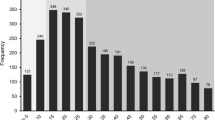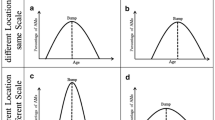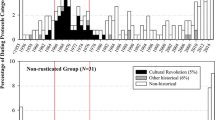Abstract
In two experiments, we systematically investigated the reasons why people retained certain autobiographical events in their memory, as well as the properties of those events and their predicted memorability. The first experiment used three methods (word-cued, free-recalled, and “memorable, interesting, and/or important”) to retrieve event memories, and examined memories from three different time-frames: very recent (within past 7 days), recent (past 2 weeks and 6 months), and older events (at least one year). In addition, data were also collected for an important transitional event recently experienced by all participants (“starting university”). The results revealed that people had access to three types of event memories: memories for life transitions, memories for older distinctive events, and memories for recent mundane events. Participants reported remembering events that were distinctive, first-time experiences, emotionally impactful, or simply because they were recent. They also predicted that older events would be more resistant to forgetting than very recent and recent events. The second experiment examined participants’ memorable and forgettable events, and found that memorable events tended to be older, while forgettable events were more likely to be recent. These findings suggested that many retrievable memorable autobiographical memories were neither important nor transitional in nature. The studies contribute to our understanding of people’s metamnemonic knowledge about their autobiographical memories.






Similar content being viewed by others
Data Availability
Supplementary data and materials (Online Supplementary Material, OSM) can be viewed at https://doi.org/10.17605/OSF.IO/FY4XQ.
Notes
Although researchers have not examined what people believe makes events memorable, other metamnenomic issues have been addressed. For example, the Metamemory in Adulthood Questionnaire (Dixon, 1989) assessed people’s beliefs about their own memory functioning and their knowledge of general memory processes. There has also been considerable research on the functions of autobiographical memory (Bluck et al., 2005; Hyman & Neisser, 1992; Sow et al., 2023; Webster, 1997). For example, Bluck et al. (2005) created a Thinking about Life Experiences (TALE) questionnaire to examine under what conditions people would reminisce about their past. The investigated conditions captured three widely accepted functions of autobiographical memory: directive function (e.g., “when I think about my future goals”), self function (e.g., “when I want to understand who I am now”), and social function (e.g., “when I want to develop a closer relationship with someone”). It is important to note that the present study was not concerned with the naïve beliefs about the functions of autobiographical memory. Rather, we were interested in understanding what people believe made an event memorable enough to be recalled.
The ten types were: older MII events, recent MII events, very recent MII events, older free-recalled events, recent free-recalled events, very recent free-recalled events, older word-cued events, recent word-cued events, very recent word-cued events, and “starting university.”
These two items also loaded on “enduring significance,” but for the current purpose, we selected the dimensions with relatively greater loadings.
Based on the factor analysis, “first-time” and “unique” loaded positively on Uniqueness, whereas “recency” loaded negatively on Uniqueness.
“Positive” and “negative” ratings were negatively correlated. Therefore, we computed the average using the difference instead of the sum.
To combine the data from the two scales, we first calculated the mean ratings on ten items of Reasons for Retention (excluding “I remember this event because it happened very recently”) and ten items of AMQ (excluding “my memory for this event is clear”) separately for the three retrieval methods and four timeframes. The rank order correlations indicated that the two questionnaires were highly consistent and could be used as two equivalent forms: For word-cued events, Spearman’s ρ = .98, n = 40, p < .001; for free-recalled events, Spearman’s ρ = .97, n = 40, p < .001; for MII events, Spearman’s ρ = .99, n = 40, p < .001.
References
Baker, R. W., McNeil, O. V., & Siryk, B. (1985). Expectation and reality in freshman adjustment to college. Journal of Counseling Psychology, 32(1), 94–103. https://doi.org/10.1037/0022-0167.32.1.94
Berntsen, D., & Bohn, A. (2010). Remembering and forecasting: The relation between autobiographical memory and episodic future thinking. Memory & Cognition, 38(3), 265–278. https://doi.org/10.3758/MC.38.3.265
Berntsen, D., & Rubin, D. C. (2006). The centrality of event scale: A measure of integrating a trauma into one’s identity and its relation to post-traumatic stress disorder symptoms. Behaviour Research and Therapy, 44(2), 219–231. https://doi.org/10.1016/j.brat.2005.01.009
Bluck, S., & Alea, N. (2009). Thinking and talking about the past: Why remember? Applied Cognitive Psychology, 23(8), 1089–1104. https://doi.org/10.1002/acp.1612
Bluck, S., Alea, N., Habermas, T., & Rubin, D. C. (2005). A tale of three functions: The self-reported uses of autobiographical memory. Social Cognition, 23(1), 91–117. https://doi.org/10.1521/soco.23.1.91.59198
Brewer, W. F. (1986). What is autobiographical memory? In D. C. Rubin (Ed.), Autobiographical memory (pp. 25–49). Cambridge University Press. https://doi.org/10.1017/CBO9780511558313.006
Brewer, W. F. (1988). Memory for randomly-selected autobiographical events. In U. Neisser & E. Winograd (Eds.), Remembering reconsidered: Ecological and traditional approaches to the study of memory (pp. 21–90). Cambridge University Press.
Brewin, C. R. (2021). Tilting at windmills: Why attacks on repression are misguided. Perspectives on Psychological Science, 16(2), 443–453. https://doi.org/10.1177/1745691620927674
Brown, N. R. (2016). Transition theory: A minimalist perspective on the organization of autobiographical memory. Journal of Applied Research in Memory and Cognition, 5(2), 128–134. https://doi.org/10.1016/j.jarmac.2016.03.005
Brown, N. R. (2023). Autobiographical memory and the self: A transition theory perspective. WIREs Cognitive Science, 14(3), e1621. https://doi.org/10.1002/wcs.1621
Brown, N. R., Lee, P. J., Krslak, M., Conrad, F. G., Hansen, T. G. B., Havelka, J., & Reddon, J. R. (2009). Living in history: How war, terrorism, and natural disaster affect the organization of autobiographical memory. Psychological Science, 20(4), 399–405. https://doi.org/10.1111/j.1467-9280.2009.02307.x
Brown, N. R., Rips, L. J., & Shevell, S. K. (1985). The subjective dates of natural events in very-long-term memory. Cognitive Psychology, 17(2), 139–177. https://doi.org/10.1016/0010-0285(85)90006-4
Conway, M. A. (2005). Memory and the self. Journal of Memory and Language, 53(4), 594–628. https://doi.org/10.1016/j.jml.2005.08.005
Conway, M. A., & Haque, S. (1999). Overshadowing the reminiscence bump: Memories of a struggle for independence. Journal of Adult Development, 6(1), 35–44. https://doi.org/10.1023/A:1021672208155
Conway, M. A., & Pleydell-Pearce, C. W. (2000). The construction of autobiographical memories in the self-memory system. Psychological Review, 107(2), 261–288. https://doi.org/10.1037/0033-295X.107.2.261
Crovitz, H. F., & Schiffman, H. (1974). Frequency of episodic memories as a function of their age. Bulletin of the Psychonomic Society, 4(5-B), 517–518. https://doi.org/10.3758/BF03334277
Demblon, J., & D’Argembeau, A. (2017). Contribution of past and future self-defining event networks to personal identity. Memory, 25(5), 656–665. https://doi.org/10.1080/09658211.2016.120509
Dixon, R. A. (1989). Questionnaire research on metamemory and aging: Issues of structure and function. In L. W. Poon, D. C. Rubin, & B. A. Wilson (Eds.), Everyday cognition in adulthood and late life (pp. 394–415). Cambridge University Press. https://doi.org/10.1017/CBO9780511759390.023
Enz, K. F., & Talarico, J. M. (2016). Forks in the road: Memories of turning points and transitions. Applied Cognitive Psychology, 30(2), 188–195. https://doi.org/10.1002/acp.3176
Faul, F., Erdfelder, E., Lang, A.-G., & Buchner, A. (2007). G*Power 3: A flexible statistical power analysis program for the social, behavioral, and biomedical sciences. Behavior Research Methods, 39(2), 175–191. https://doi.org/10.3758/BF03193146
Golding, J. M., Sanchez, R. P., & Sego, S. A. (1996). Do you believe in repressed memories? Professional Psychology: Research and Practice, 27(5), 429–437. https://doi.org/10.1037/0735-7028.27.5.429
Groninger, L. D. (1979). Predicting recall: The “feeling-that-I-know” phenomenon. The American Journal of Psychology, 92(1), 45–58. https://doi.org/10.2307/1421478
Gu, X., Tse, C.-S., & Brown, N. R. (2017). The effects of collective and personal transitions on the organization and contents of autobiographical memory in older Chinese adults. Memory & Cognition, 45, 1335–1349. https://doi.org/10.3758/s13421-017-0733-0
Habermas, T., & Bluck, S. (2000). Getting a life: The emergence of the life story in adolescence. Psychological Bulletin, 126(5), 748–769. https://doi.org/10.1037/0033-2909.126.5.748
Hyman, I. E., & Neisser, U. (1992). The role of the self in recollections of a seminar. Journal of Narrative & Life History, 2(2), 81–103. https://doi.org/10.1075/jnlh.2.2.01rol
Jansari, A., & Parkin, A. J. (1996). Things that go bump in your life: Explaining the reminiscence bump in autobiographical memory. Psychology and Aging, 11(1), 85–91. https://doi.org/10.1037/0882-7974.11.1.85
Jost, A. (1897). The strength of associations in their dependence on the distribution of repetitions. Zeitschrift für Psychologie und Physiologie der Sinnesorgane, 16, 436–472.
Kirwan, C. B., Bayley, P. J., Galván, V. V., & Squire, L. R. (2008). Detailed recollection of remote autobiographical memory after damage to the medial temporal lobe. PNAS Proceedings of the National Academy of Sciences of the United States of America, 105(7), 2676–2680. https://doi.org/10.1073/pnas.0712155105
Koppel, J., & Berntsen, D. (2015). The peaks of life: The differential temporal locations of the reminiscence bump across disparate cueing methods. Journal of Applied Research in Memory and Cognition, 4(1), 66–80. https://doi.org/10.1016/j.jarmac.2014.11.004
Koppel, J., & Berntsen, D. (2015). Beyond the distinction between word-cued versus important autobiographical memories: A reply. Journal of Applied Research in Memory and Cognition, 4(1), 90–92. https://doi.org/10.1016/j.jarmac.2015.01.002
Larsen, S. F. (1992). Potential flashbulbs: Memory of ordinary news as the baseline. In E. Winograd & U. Neisser (Eds.), Affect and accuracy in recall: Studies of “flashbulb” memories (pp. 32–64). Cambridge University Press.
Levine, B., Svoboda, E., Hay, J. F., Winocur, G., & Moscovitch, M. (2002). Aging and autobiographical memory: Dissociating episodic from semantic retrieval. Psychology and Aging, 17(4), 677–689. https://doi.org/10.1037/0882-7974.17.4.677
Linton, M. (1975). Memory for real-world events. In D. A. Norman & D. E. Rumelhart (Eds.), Explorations in cognition (pp. 376–404). W. H. Freeman and Company.
Lovelace, E. A. (1984). Metamemory: Monitoring future recallability in free and cued recall. Bulletin of the Psychonomic Society, 22(6), 497–500. https://doi.org/10.3758/BF03333889
McAdams, D. P. (2001). The psychology of life stories. Review of General Psychology, 5(2), 100–122. https://doi.org/10.1037/1089-2680.5.2.100
Nelson, K. (1993). The psychological and social origins of autobiographical memory. Psychological Science, 4(1), 7–14. https://doi.org/10.1111/j.1467-9280.1993.tb00548.x
Otgaar, H., Howe, M. L., Patihis, L., Merckelbach, H., Lynn, S. J., Lilienfeld, S. O., & Loftus, E. F. (2019). The return of the repressed: The persistent and problematic claims of long-forgotten trauma. Perspectives on Psychological Science, 14(6), 1072–1095. https://doi.org/10.1177/1745691619862306
Otgaar, H., Wang, J., Howe, M. L., Lilienfeld, S. O., Loftus, E. F., Lynn, S. J., Merckelbach, H., & Patihis, L. (2020). Belief in unconscious repressed memory is widespread: A comment on Brewin, Li, Ntarantana, Unsworth, and McNeilis (2019). Journal of Experimental Psychology: General, 149(10), 1996–2000. https://doi.org/10.1037/xge0000721
Pancer, S. M., Hunsberger, B., Pratt, M. W., & Alisat, S. (2000). Cognitive complexity of expectations and adjustment to university in the first year. Journal of Adolescent Research, 15(1), 38–57. https://doi.org/10.1177/074355840015100
Perrig-Chiello, P., & Perren, S. (2005). Biographical transitions from a midlife perspective. Journal of Adult Development, 12(4), 169–181. https://doi.org/10.1007/s10804-005-7085-x
Pillemer, D. B. (1998). Momentous events, vivid memories. Harvard University Press.
Pillemer, D. B. (2001). Momentous events and the life story. Review of General Psychology, 5(2), 123–134. https://doi.org/10.1037/1089-2680.5.2.123
Pillemer, D. B., Goldersmith, L. R., Panter, A. T., & White, S. H. (1988). Very long-term memories of the first year in college. Journal of Experimental Psychology: Learning, Memory, and Cognition, 14(4), 709–715. https://doi.org/10.1037/0278-7393.14.4.709
Prebble, S. C., Addis, D. R., & Tippett, L. J. (2013). Autobiographical memory and sense of self. Psychological Bulletin, 139(4), 815–840. https://doi.org/10.1037/a0030146
Radvansky, G. A., Doolen, A. C., Pettijohn, K. A., & Ritchey, M. (2022). A new look at memory retention and forgetting. Journal of Experimental Psychology: Learning, Memory, and Cognition. Advance online publication. https://doi.org/10.1037/xlm0001110
Roediger, H. L., III., & Marsh, E. J. (2003). Episodic and autobiographical memory. In A. F. Healy & R. W. Proctor (Eds.), Handbook of psychology: Experimental psychology (Vol. 4, pp. 475–497). John Wiley & Sons Inc.
Rubin, D. C., Boals, A., & Berntsen, D. (2008). Memory in posttraumatic stress disorder: Properties of voluntary and involuntary, traumatic and nontraumatic autobiographical memories in people with and without posttraumatic stress disorder symptoms. Journal of Experimental Psychology: General, 137(4), 591–614. https://doi.org/10.1037/a0013165
Rubin, D. C., & Kozin, M. (1984). Vivid memories. Cognition, 16(1), 81–95. https://doi.org/10.1016/0010-0277(84)90037-4
Rubin, D. C., Schrauf, R. W., & Greenberg, D. L. (2003). Belief and recollection of autobiographical memories. Memory & Cognition, 31(6), 887–901. https://doi.org/10.3758/BF03196443
Shi, L., & Brown, N. R. (2021). Beliefs about transitional events: The effect of experience and life-script consistency. Frontiers of Psychology, 12, 727524. https://doi.org/10.3389/fpsyg.2021.727524
Singer, J. A., Blagov, P., Berry, M., & Oost, K. M. (2013). Self-defining memories, scripts, and the life story: Narrative identity in personality and psychotherapy. Journal of Personality, 81(6), 569–582. https://doi.org/10.1111/jopy.12005
Singer, J. A., & Salovey, P. (1993). The remembered self: Emotion and memory in personality. Free Press.
Smith, M. E. (1952). Childhood memories compared with those of adult life. The Journal of Genetic Psychology, 80(2), 151–182. https://doi.org/10.1080/08856559.1952.10533620
Sow, F., Dijkstra, K., & Janssen, S. M. J. (2023). Developments in the functions of autobiographical memory: An advanced review. WIREs Cognitive Science, 14(3), e1625. https://doi.org/10.1002/wcs.1625
Svob, C., Brown, N. R., Reddon, J. R., Uzer, T., & Lee, P. J. (2014). The Transitional Impact Scale: Assessing the material and psychological impact of life transitions. Behavior Research Methods, 46(2), 448–455. https://doi.org/10.3758/s13428-013-0378-2
Talarico, J. M., & Rubin, D. C. (2003). Confidence, not consistency, characterizes flashbulb memories. Psychological Science, 14(5), 455–461. https://doi.org/10.1111/1467-9280.02453
Thompson, C. P. (1982). Memory for unique personal events: The roommate study. Memory & Cognition, 10(4), 324–332. https://doi.org/10.3758/BF03202424
Thomsen, D., & Berntsen, D. (2008). The cultural life script and life story chapters contribute to the reminiscence bump. Memory, 16(4), 420–435. https://doi.org/10.1080/09658210802010497
Underwood, B. J. (1966). Individual and group predictions of item difficulty for free learning. Journal of Experimental Psychology, 71(5), 673–679. https://doi.org/10.1037/h0023107
Wagenaar, W. A. (1986). My memory: A study of autobiographical memory over six years. Cognitive Psychology, 18(2), 225–252. https://doi.org/10.1016/0010-0285(86)90013-7
Webster, J. D. (1997). The reminiscence functions scale: A replication. The International Journal of Aging & Human Development, 44(2), 137–148. https://doi.org/10.2190/AD4D-813D-F5XN-W07G
Funding
Natural Sciences and Engineering Research Council of Canada, NSERC Discovery Grant (RGPIN-2018-04537).
Author information
Authors and Affiliations
Corresponding author
Additional information
Publisher's Note
Springer Nature remains neutral with regard to jurisdictional claims in published maps and institutional affiliations.
Rights and permissions
Springer Nature or its licensor (e.g. a society or other partner) holds exclusive rights to this article under a publishing agreement with the author(s) or other rightsholder(s); author self-archiving of the accepted manuscript version of this article is solely governed by the terms of such publishing agreement and applicable law.
About this article
Cite this article
Shi, L., Brown, N.R. & Reimer, P.J.C. Exploring the metamnemonic and phenomenal differences between transitional and mundane events. Mem Cogn (2024). https://doi.org/10.3758/s13421-024-01534-7
Accepted:
Published:
DOI: https://doi.org/10.3758/s13421-024-01534-7




